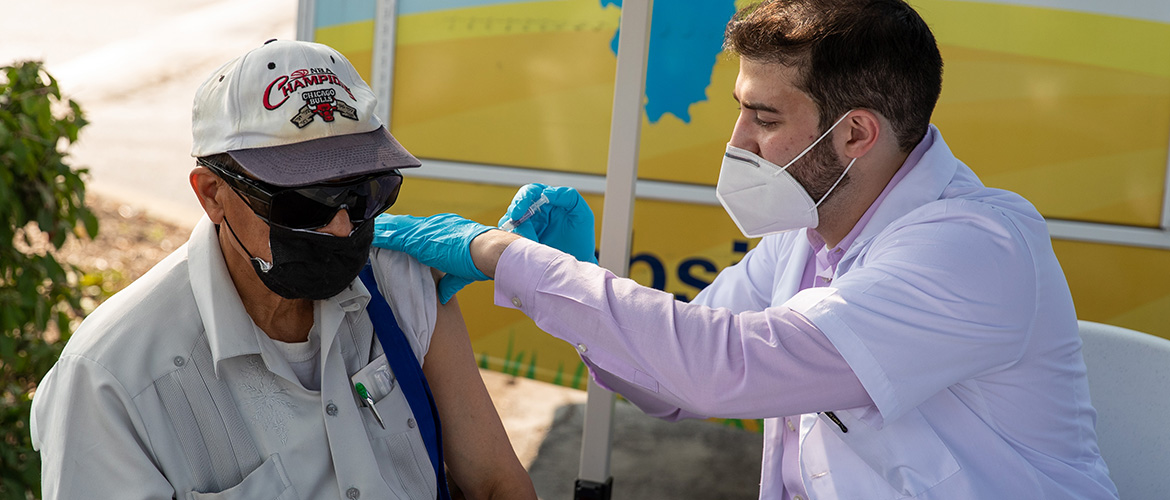This year most families are focused one thing: Avoiding COVID-19.
But other dangerous diseases haven’t gone away, and health experts are concerned that a decline in routine immunizations could fuel another public health crisis.
“It’s really important this year — especially given the many priorities people are facing — that people remain vigilant to ensure they and their children are up to date on recommended vaccinations,” says Dr. William Frese, a pediatrician and a medical director for Blue Cross and Blue Shield of Illinois.
“Illnesses such as pertussis (whooping cough), varicella (chickenpox), measles, mumps, meningitis, and influenza are still out there and can spread very quickly in the community,” he says.
The importance of catching up on recommended immunizations is a key part of BCBSIL’s Wellness Can’t Wait public awareness campaign. The insurer is urging people to talk to their doctors about safe options for resuming needed preventive care they may have postponed because of the pandemic.
BCBSIL’s insurance claims indicate members have been returning to the doctor in recent months, but significant gaps remain. Immunizations for members age 2 and older in commercial PPO plans were down 27% from March 1 to July 31 compared with the same period in 2019.
Surveys suggest pediatrician offices are increasingly adding appointments for immunizations — but also that some parents are still hesitant to come in because of COVID-19.
They should know, Frese says, that health care providers have taken steps amid COVID to deliver care as safely as possible. These include:
- Screening staff, patients and families for potential COVID-19 symptoms
- Requiring face masks for clinic entry
- Doing as much of the visit as possible by telehealth and online patient portals
- Designating separate sick and well waiting and examination spaces
- Implementing new cleaning procedures
- Limiting the number of people in the clinic at the same time
Providers, pharmacies, and community partners are also embracing mobile and drive-through clinics to help boost immunization rates.
Mobilizing immunization efforts
The Chicago Department of Public Health, in partnership with BCBSIL’s Care Van Program®, is offering appointment-only vaccinations to Chicago Public Schools students. The city’s health department is among several agencies the Care Van Program supports across Illinois to boost the rate of childhood immunizations.
Clinic staff, wearing protective masks and gowns, perform quick health screenings before they vaccinate children.
“It is safe to bring back the kids to get them vaccinated,” says Maribel Chavez-Torres, deputy commissioner of the health department’s immunization program. “It’s worth the effort to get children vaccinated.”
Since July, the Care Van Program has helped provide about 2,500 immunizations to more than 1,250 children at 15 Chicago schools.
The strict safety measures, however, have limited the number of children the program can serve. “We’re really just scratching the surface in this (COVID-19) environment,” says Stephanie Peden-Fox, BCBSIL community relations manager.
In 2019, the Care Van program administered more than 10,000 immunizations, as well as 13,000 other services, across Illinois in Champaign-Urbana, Chicago, Edgar County, Madison County, Peoria and East St. Louis. It has been working with the Chicago public health department to vaccinate students for 30 years.
“The Care Van program has been a great partner,” Chaves-Torres says. “It is a critical component in the work we do in key communities that may lack access to care.”
Physician advocacy
As people begin to return to their doctors’ offices, Frese says, they and their providers should look for opportunities to vaccinate — no matter the primary reason for the visit. In addition to helping them get caught up on recommended vaccinations, this minimizes need for more clinic trips and potential exposure to COVID-19.
Treating someone’s diabetes or sprained ankle? Why not check for gaps in the patient’s immunization records, too?
Doctors should be prepared to educate patients about vaccines, and they may need to get more comfortable making strong recommendations — especially for HPV and influenza, Frese says.
About 45% of eligible adults got a flu shot in Illinois in the 2018-2019 season, according to the Centers for Disease Control and Prevention, well below the national goal of 70%.
“Given COVID-19, optimizing influenza vaccination rates may be especially important for this upcoming influenza season,” Frese says. “Making a confident and directive recommendation, engaging in dialogue and addressing questions has been shown to increase vaccination rates.”

